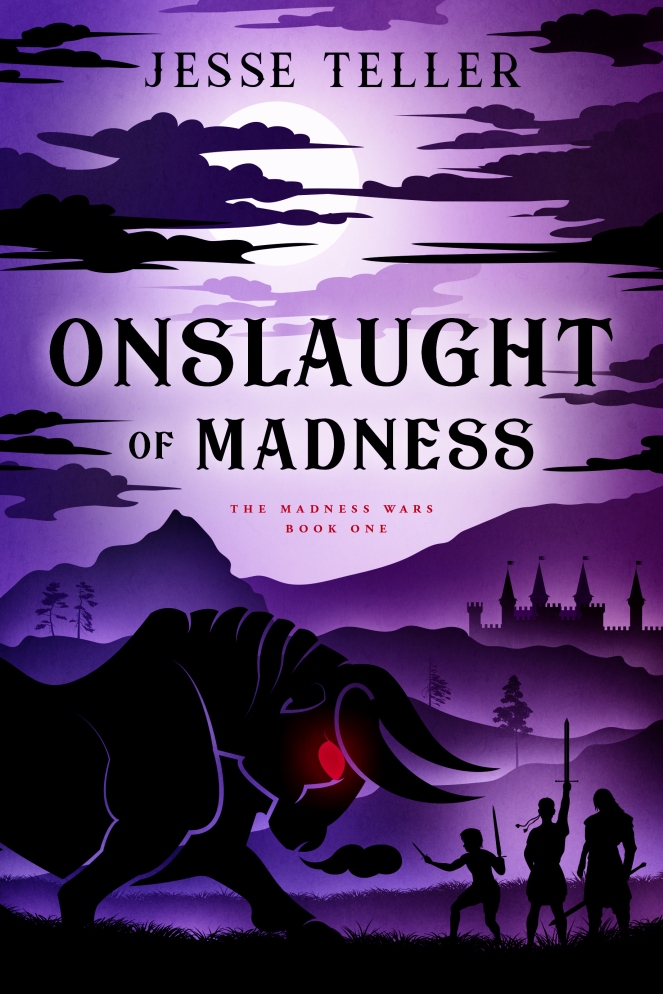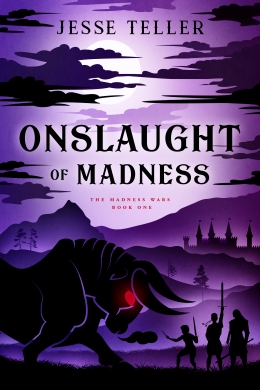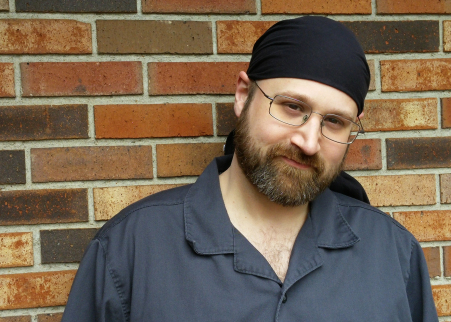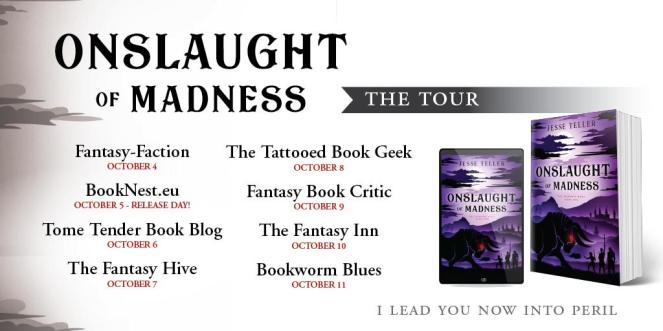
Today on The Tattooed Book Geek I am pleased to be welcoming back Jesse Teller as part of the tour for and to help promote his latest release Onslaught of Madness with a fascinating guest post that looks at how he built his own writing style.
Onslaught of Madness (The Madness Wars #1).
- Format: Kindle Edition
- File Size: 3212 KB
- Print Length: 869 pages
- Sold by: Amazon Media EU S.à r.l.
- Language: English
- ASIN: B07V1STG97
- Amazon UK / Goodreads

The Drine war machine needs to be constantly fed and has turned its sights on Tienne. Warlord Rextur devoted his life to planning this invasion, so how did he lose the element of surprise? And who is this emerging rival Peter Redfist? He can’t be much of a problem. The god of destruction has long favored Rextur. His faith is strong and his legions mighty. Who could withstand their onslaught?
Guest Post: Building a Style.
I had not done my homework, and my voice and my style were suffering.
I went to a workshop for aspiring authors in 2008 called Break Out Novel Intensive put on by a genius named Donald Maass. Donald is an agent in New York with an impressive client list as well as an author himself who writes under a pen name. After studying story for most of his life, he put together a workshop that talked about how to make your next novel a break out success.
The workshop was eye-opening in many different ways. We got to submit 50 pages of our book to him and he gave us his opinion. This is a chance few get, and I jumped at it. When he read the first 50 pages of my book, his first question was, “What do you read?” At that point I had read a lot of different things, King mostly, and when I told him this, he said I could learn a lot from King, but the issue was I had no discernible style. He said because of that, my piece floundered. He gave me a few names and dismissed me, saying the premise of my book was broken and I needed to start all over again from blank document.
At this point, you have a choice to make. Do you scrap and walk away, or do you keep chopping? Well, I was sore from my experience and I took a few months to feel sorry for myself. I went through the gambit of emotions, ‘Screw him, how does he know anything about my vision and my future?’ ‘Screw him, he just doesn’t see genius when it is showed to him.’ I spent a little time on, ‘He is jealous and doesn’t want me to succeed.’ All of these places are crap.
The reality was, this guy is good at what he does and he makes good money doing it, because he can spot genius when it is set before him. It’s kinda his shtick. The reality was that he doesn’t know anything about my vision because I didn’t either. I had no idea what I wanted to do with my world. I was fledgling, and if he had given me a contract that day for a three-book deal, I would have been lost on how to fill the contract. But my favorite is the jealous thing. Why would an agent do that to himself? If you are a better writer than he is, then he knows you will make money. Why toss you to a competitor and let you make money for someone else?
No, the truth was what it was always going to be. I was lost. I had no style. I had no voice, and I was all over the place. So I did what he told me to do. I went reading.
The next year, I read everything with a purpose. More King. Can’t go wrong with King. But why not read George RR Martin? I had no idea who that was, but Donald had spoken the name. I wanted classic, so why not read Emily and Charlotte Bronte. I wanted a taste for adventure, so I tossed in my favorite Robert E. Howard. I was told Erikson, so I ran there. Then I grabbed a very popular book at the time called The Alchemist. There were other things thrown in there that gave me texture, but this was the pool I reached into.
I read four to six hours a day. After my workout, after Bekah went to bed, after my shower. I plummeted through all of it like a diver dropping from the high dive.
They were my textbooks and I got close to see just how to do the job I wanted to do. I read with purpose. My friend artist Chris Mostyn told me once that when he goes to a museum or an exhibition, he gets close. Lean in real close to see the tiny minutia of what the painter had done with the brush on that ever-so-delicate pearl. He studies the groove of the painting, sticking his nose as close as respectfully possible to get as much out of his study as he could. I did the same thing with these books.
Word, paragraph, and phrase, I built every bit of my understanding on the pieces I could get from each of these writers.
Howard was always going to be an influence. From him, I learned setting and character. I learned to put my reader in the sweat of the jungle. How to build one character bigger than life. How to strike fear. How to move quickly.
Erikson showed me scope. A wide expanse of world lived within his work. A world more huge than anything I had seen before, more huge than I ever thought possible.
Martin taught me not to flinch away from killing them all. I think he teaches everyone that. But the biggest, most important thing that man taught me was Point of View. Of the many words I read of his, the thing that affected me most was his self-discipline when it came to point of view. Each chapter had one point of view character. Each point of view character was chosen for a reason. If you have to have eyes in a particular part of the story, the choice of whose eyes they are is the most important choice you will ever make. I learned that if I told The Manhunters from Rayph’s point of view it would be a completely different story than if told from Smear’s. I learned from Martin how to be deliberate in my point of view choices. It has made me who I am as a writer more than any other thing.
The one that affected me most over all the rest was The Alchemist by Paulo Coelho. The thing I found so stunning about his book was the sparseness of it. Here was a guy who was capable of capturing so much of his description with almost no words. Coelho used every word cunningly, but more than that I felt as if this writer had a great deal of trust in his reader. This was not a book that handed you perfect description of the look of the settings or characters. He did not care if you saw his character exactly as he saw him. Who cares about the tiny bit of bump on his nose? Who cares about the leaves or what color they were? His story was caught up in the emotion and the vital parts of the telling.
So if I tell you to picture a boy with full hair, filthy clothes, and a scar. You see a boy with full hair, filthy clothes, and a scar. You have done all the work for me. Does it matter to me if you put red hair on this boy, make him a blond or brunette? If it matters to the story, yes, but really, how often does it? Does it matter to the story if he has blue hair? In high school I once asked a friend to describe what I looked like on paper. She had been my friend for six years and she wrote I had black hair. But my hair was brown. So how did that matter?
My mind was blown. How much of it did I really need to describe if I trusted the reader’s imagination for the little stuff? One of you saw that boy in rags. Another in burlap. Another of you saw him in ratted jeans. Well if we put him in a fantasy setting, the reader seeing the jeans will be few and far between. How about the desert? Well, without me even saying anything, you have made it vast. You have sand in yours, most likely. You have a pounding sun and you are getting thirsty.
What I learned is that I needed to trust my readers. I needed to trust that my readers could fill in the blanks I left behind with details they were comfortable with. Look and really search for the vital things to describe. Peter’s eyes, his red hair, but leave his build for the reader. Leave what he wears to the reader. That stuff doesn’t define him anyway. Give him his sling wrapped around his head and you’re done.
The truth is you are better at picturing Peter than I could ever be at describing him. And no matter how I try to force a look on you, your original vision of him will hold.
At times it even hurts to describe too much. At times I can’t even describe what I see. For instance, I write dark fantasy in a western setting. Middle Ages to Dark Ages time frame. So if I described Donnie the Ego as I see him, you would be confused. I can never tell you, for instance, that every time I see this character he is wearing a Rolex. That is mine. A trait I will carry with me to the grave that I can’t put in a book.
I write in a big world, with a classical lean, with larger than life characters, in strict point of view, with unflinching dedication to story, and I do it letting you fill in the blanks for me. I trust my readers to be smart, to be creative and dedicated.
Why shouldn’t I? It’s my style. I built it from the ground up.

About Jesse Teller.

Jesse Teller fell in love with fantasy when he was five years old and played his first game of Dungeons & Dragons. The game gave him the ability to create stories and characters from a young age. He started consuming fantasy in every form and, by nine, was obsessed with the genre. As a young adult, he knew he wanted to make his life about fantasy. From exploring the relationship between man and woman, to studying the qualities of a leader or a tyrant, Jesse Teller uses his stories and settings to study real-world themes and issues.
He lives with his supportive wife, Rebekah, and his two inspiring children, Rayph and Tobin.
Author links:
Follow the tour.


This is why I’m terrified to let people read what I’ve written. I’m just waiting for them to tell me it’s crap and that I need to start all over. Eek. 😬
LikeLiked by 1 person
As long as you did your research properly then I’m sure that your Dino porn book and writing will be great.😜📚
LikeLike
I love this guest post. I always think it’s fascinating to hear about other writer’s experiences and process.
LikeLiked by 1 person